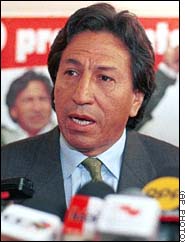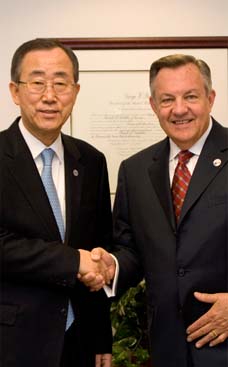
“I don’t believe in the effectiveness of trickle down,” he said. “We need to grow, but at the same time, construct deliberate social polices for the short term, and medium and long run. I don’t know any more effective weapon in the world to free people from poverty than investing in nutrition, health and education.” During his tenure as president from 2001 to 2006, Toledo put this philosophy to work by implementing a series of micro-credit programs. One program, “juntos,” made conditional loans of $30 to rural, impoverished women. The move empowered the women, who spent the money more effectively than their male counterparts, who were more prone to buying alcohol. “The [International Monetary Fund] went bananas,” he said. “But I don’t know why the Nobel Prize Committee has not discovered that the best economists in the world are poor women.” Alejandro Toledo grew up in Chimbote and was befriended by Peace Corps Volunteers who helped him study in the United States. Later he was a language instructor in Brockort's Peace Corps/College Degree Program. Elected President of Peru in 2000, Toledo invited the Peace Corps to return to Peru after a 27 year absence. He is presently a visiting Fellow at Stanford University.
Toledo talks faith in democracy
Toledo talks faith in democracy
Peru’s former president urges Latin America to confront health and education
October 17, 2007
By Patrick Fitzgerald
Former Peruvian President Alejandro Toledo called upon Latin American leaders yesterday to make the social investments needed to meet the challenges of poverty and inequality and secure a future of sustainable democratic development.
Speaking in conversation with Hoover Senior Fellow Larry Diamond as part of the School of Education’s Cubberley Lecture Series, Toledo Ph.D. ‘93 stressed the importance of investing in nutrition, health and education to ensure that democratic governments meet the needs of their citizens in the face of populist challenges from the left.
“If we are able to reduce poverty, inequality, social exclusion, then people will begin recovering faith in democracy again,” he said. “Political democracy makes very little sense if ultimately it is not accompanied by economic and social democracy at a micro level.”
Toledo, an economist who also earned master’s degrees in education and economics from Stanford, spent time consulting the United Nations and the World Bank before being elected president of Peru in 2001. Economic growth, he said, is an “indispensable component” of democratic development, but one that must be paired with social policies to ensure that growth benefits all segments of society.
“I don’t believe in the effectiveness of trickle down,” he said. “We need to grow, but at the same time, construct deliberate social polices for the short term, and medium and long run. I don’t know any more effective weapon in the world to free people from poverty than investing in nutrition, health and education.”
During his tenure as president from 2001 to 2006, Toledo put this philosophy to work by implementing a series of micro-credit programs. One program, “juntos,” made conditional loans of $30 to rural, impoverished women. The move empowered the women, who spent the money more effectively than their male counterparts, who were more prone to buying alcohol.
“The [International Monetary Fund] went bananas,” he said. “But I don’t know why the Nobel Prize Committee has not discovered that the best economists in the world are poor women.”
The programs also identified an entire segment of the population, roughly 20 percent, who were undocumented and did not show up in census tallies or economic reports.
“The whole macroeconomic figure was bullshit,” said the former president, sporting a navy blue suit and blue tie.
While enduring one of the highest levels of inequality in the world, Peru’s economy has also been growing consistently at five percent over the last half-decade. The region, Toledo said, now has a unique chance to generate growth by further integrating with the global economy.
“Now, like never before, Latin America as a region has the enormous opportunity to make a significant jump to place itself in a very preferential place in the world economy,” he said.
With non-traditional exports such as grapes and other agricultural products booming, Peruvian producers should be looking toward emerging markets in China and India, Toledo explained.
“I’m not very ambitious, I just want five percent of the Chinese market,” he deadpanned, drawing laughs from the standing-room only audience.
A self-described “statistical fluke,” Toledo was one of 16 children raised in Cabana, a small village in the Andes. He first worked shining shoes at the age of seven, going on to study at the University of San Francisco on a soccer scholarship. He went on to become Peru’s first president of indigenous descent, inheriting a nation described by Diamond as a “post-authoritarian shattered mess” following the tumultuous presidency of Alberto Fujimori.
Diamond, a co-editor of the Journal of Democracy, described the duality of attitudes toward democracy in Latin America. There has been “astonishing progress” in the advance of freedom on one hand, he said, going along with “very high levels of dissatisfaction in the way democracy is working.”
Much of the problem has stemmed from perceptions of democratic leaders as ineffective or corrupt, a conception populist leaders such as Venezuela’s Hugo Chavez and Bolivia’s Evo Morales have seized upon while espousing their own brand of “21st century socialism.” Over half of Latin Americans express a generally positive view of democracy, Diamond said, but 70 percent see little or no equality in their countries’ laws.
For Toledo, whose approval ratings as president once dropped as low as 10 percent, leadership stems from having a long-term vision for growth and success.
“A leader is one who has the courage to make national positions thinking for the next generation, rather than making government policy thinking for the next election,” he said.
“How do we get a leader, and not a [politician], elected as president of the United States?” responded Diamond.
Toledo and his wife, Eliane Karp-Toledo, a lecturer at the School of Education and the Department of Anthropological Sciences, settled down on the Farm in 2006. Toledo spent last year reflecting on his term as president while serving as a visiting fellow at the Center for Advanced Study in the Behavioral Sciences. This year, he accepted an invitation from Diamond to join the Center on Democracy, Development and the Rule of Law, part of the University’s Freeman Spogli Institute for International Studies (FSI), as a distinguished scholar.
Responding to a question from the audience, Toledo described his return to Stanford as a “soft landing” after the “intense experience” of serving as chief executive of a nation of nearly 30 million people.
“My friend, every player in a game needs a rest,” he said. “Give me a break.”













